Engineering for success

ENERGY AND ENVIRONMENTAL ENGINEERING HELP
BUSINESSES BOOST EFFICIENCY AND CUT POLLUTION.
As a child, Grace Jacobson could walk outside and see flowers blooming and vegetables growing in a backyard garden. She would camp, hike and sail with her family.
“I got to see what the world was like, and I want to keep it that way and keep it pretty,” she says.
Jacobson, a senior engineering major from Cary, is among a team of student research assistants who work with East Carolina University’s Center for Sustainable Energy and Environmental Engineering, also known as CSE3.
The center’s projects focus on everything from environmental and energy management to pollution prevention, no-waste water desalination and green manufacturing. Workshops and webinars bring in businesses and manufacturers to learn how they can reduce costs and help the environment at the same time.
“It’s very exciting because ECU is leading these efforts,” says Tarek Abdel- Salam, the center’s director as well as an engineering professor and associate dean for research in the College of Engineering and Technology.“We have a unique area of pollution prevention.”
For the 42 undergraduate and seven graduate students who work on the center’s projects, they get real-world experience that can help them land jobs in industry or with governmental agencies as environmental engineers.
“A really big thing is the experience we get from this,” says Alex Ferro, a junior engineering major with a concentration in electrical engineering from Mount Olive. “I have been able to really grow my interpersonal skills. I was able to talk to people about things that matter and network with those people. I learned so much about solar power and solar panels and solar energy just from this one job. I don’t even know that I’ll be able to use everything I learned about it, but it’s amazing how much you can learn when you just sit down and focus on it.”
For students conducting energy audits, they’ll spend a day — sometimes two — with a team of ECU professors examining a company’s processes and energy use through such equipment as thermal imagers and infrared cameras.
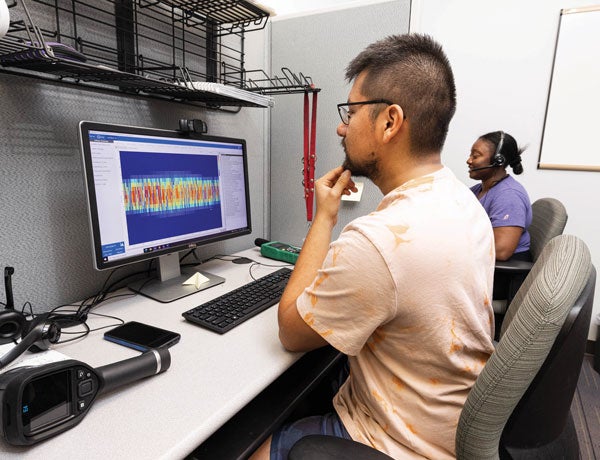
Students Alex Ferro and Ariel Lineberger work on reports in the Center for Sustainable Energy and Environmental Engineering student office in the Rivers Building.
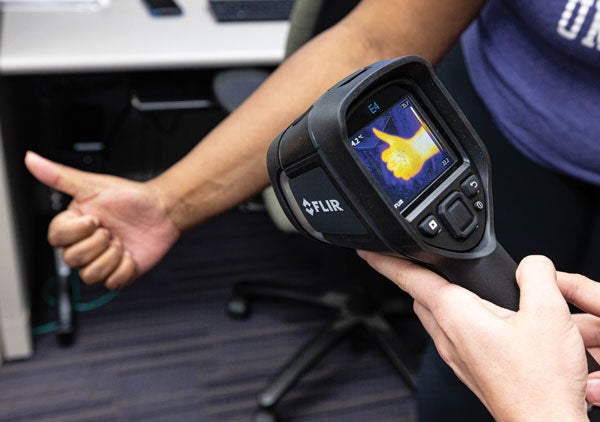
A thermal imaging camera is tested in
the Center for Sustainable Energy and
Environmental Engineering office.

Students and faculty with the Center for Sustainable Energy and Environmental Engineering perform an energy assessment at Shortway Brewing’s facility in Trenton. Owner Matt Shortway, top right, believes the assessment can provide opportunities to improve efficiency at the facility.
“I like that part, being able to help people in little ways, but they all add up,” Ferro says.
Once the site visit is complete, the data is analyzed and compiled into graphs, charts and recommendations designed to help the business save energy and cut costs. The entire process takes about a month.
“The assessments themselves, there is so much that goes into them,” Ferro says. “We spend an entire day at the facility because we want to get as much information as we can. We don’t want to go back and tell them we missed something. We want to get everything and anything, no matter the size, and incorporate that into our assessments.”
The companies appreciate the support.
“As a numbers guy, efficiency is definitely something that I want, so I jumped on this opportunity,” says Matt Shortway, who hosted CSE3 students and staff for a site visit at his Shortway Brewing facility in Trenton in 2021. “Efficiency affects the bottom line. Any time you can save a little bit and have less waste, whether it be energy or to be able to make more product in the same amount of space, that’s good for business and good for the environment.”
“Helping these businesses with their income or revenue areas will help them hire more people and create more jobs that can help make their communities a lot better,” says Lineberger, who grew up in the small western North Carolina town of Nebo. “A lot of companies are struggling, and they need to save money. If they save money, they can stay in business. This is why we’re here. … If you lose a business, that can be detrimental to the whole community. It’s about saving the environment and reducing pollution, but it’s also about helping people in that situation who would be affected a lot longer.”
Lineberger says the center is providing her the education she wanted when she decided to attend ECU.

Students Ariel Lineberger, Alex Ferro and Grace Jacobson get real-world experience through the work they do with the Center for Sustainable Energy and Environmental Engineering, setting them up for future employment.
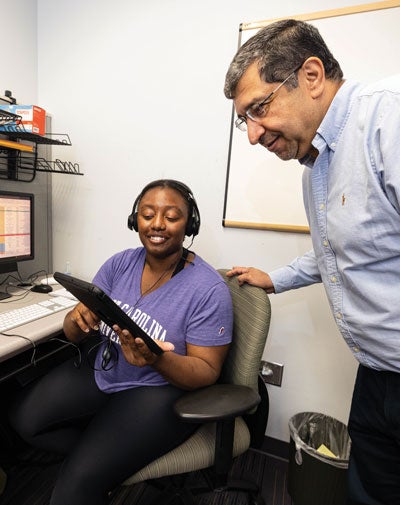
Tarek Abdel-Salam, director of the Center for Sustainable Energy and Environmental Engineering, works with student Ariel Lineberger on an energy assessment report.
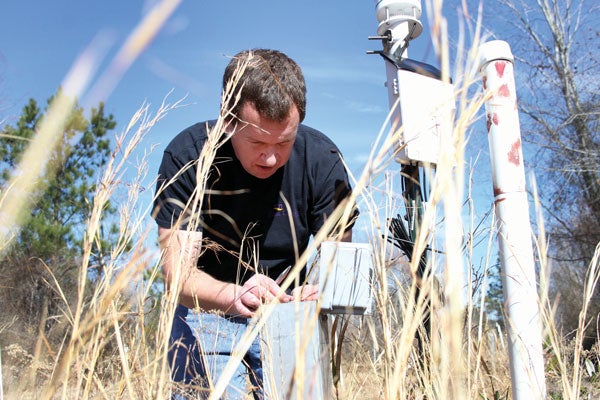
Randall Etheridge, associate professor in the Department of Engineering, led a team of students from various departments on campus, the Water Resources Center and the Center for Sustainable Energy and Environmental Engineering in the installation of water sensors as part of a research project on the West Research Campus.
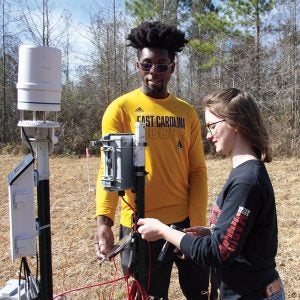
With affiliated faculty from engineering, economics, biology, geological studies and coastal studies, the center features an interdisciplinary approach that provides benefits to students and businesses alike.
“They’re all just in it for the students and the environment, and that’s awesome,” Jacobson says of the faculty.
During the last 18 months, the center has conducted 20 energy, lean manufacturing or water assessments, all of which are free to the businesses. It has also put on 14 technical webinars, eight one-day training courses and one workshop, most of which are also free of charge. The center also supports interdisciplinary projects on campus, such as the installation of water sensors on the West Research Campus to support environmental research through the departments of biology, geology and engineering and the ECU Water Resources Center.
“I think it’s a great mission,” Jacobson says. “We’re a small group of students and faculty trying to make North Carolina small businesses better for the environment and better for themselves. It saves money for them while also saving energy and reducing the waste that they produce. We’re trying to educate them as well through all the workshops we invite them to, and we make contact with them regularly. We invite them to trainings. It’s a wholesome goal that we have here.”